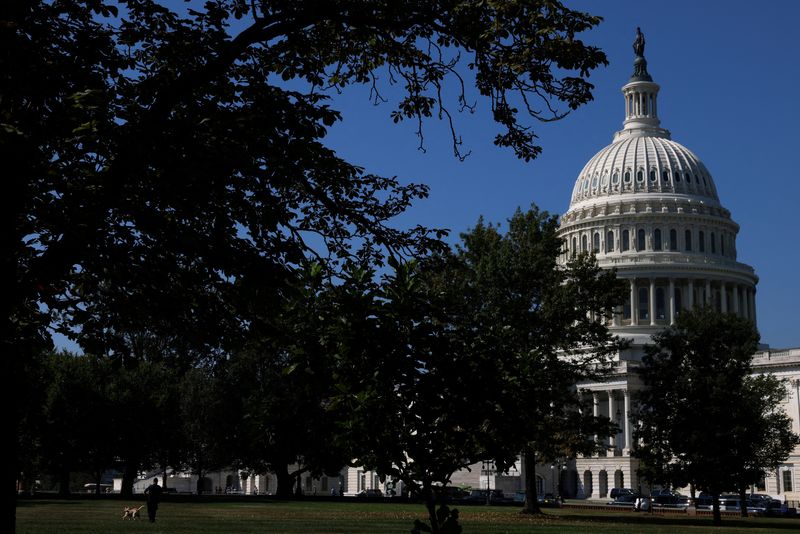(Reuters) - Large swaths of the U.S. government could temporarily close on Oct. 1 if Congress does not approve spending bills due to a dispute between far-right Republicans and other lawmakers.
Here are some facts about U.S. government shutdowns:
WHY WOULD THE GOVERNMENT SHUT DOWN?
Congress must allocate funding to 438 government agencies each fiscal year, which ends on Sept. 30. If lawmakers don't pass those bills before the new fiscal year starts, those agencies will be unable to continue operating as normal.
There have been 20 shutdowns since the 1970s, according to the Congressional Research Service. The most recent one was also the longest, lasting 35 days between December 2018 and January 2019 due to a dispute over border security.
Lawmakers often temporarily push that deadline back by extending agencies' current funding levels in a "continuing resolution" so they can continue negotiating.
WHAT IS THE IMPACT?
Hundreds of thousands of federal workers would be furloughed without pay and a wide range of services could be disrupted, from passport applications to trash pickup at national parks.
Other workers deemed "essential" would remain on the job, though they also would not get paid. Services like mail delivery, tax collection and U.S. debt payments would continue.
Shutdowns that last only a few days would have little practical impact, particularly if they occur over a weekend, but the broader economy could suffer if federal employees begin missing paychecks after two weeks.
A shutdown would directly reduce GDP growth by around 0.15 percentage points for each week it lasts, according to Goldman Sachs, but growth would rise by the same amount after the shutdown was resolved.
The 2018-2019 shutdown cost the economy about $3 billion, equal to 0.02% of GDP according to the Congressional Budget Office.
WHAT FUNCTIONS ARE CONSIDERED 'ESSENTIAL'?
Each department and agency has a contingency plan to determine which employees must keep working without pay.
The 2018-2019 shutdown furloughed roughly 800,000 of the federal government's 2.2 million employees. The White House budget office did not say how many would be affected in total this time.
The Department of Homeland Security said it would keep 227,000 of its 253,000 workers on the job, including border security agents and the Coast Guard.
The Department of Justice said in its 2021 contingency plan that 85% of its 116,000 employees would be considered essential, including prison staff and prosecutors. Criminal litigation would continue, although most civil litigation cases would be paused.
Air travel would remain relatively unimpeded, but in previous shutdowns the Transportation Security Administration has warned that airport-security screeners could call in sick at an increased rate.
It is not clear whether the United States' 63 national parks would remain open. During a shutdown in 2013, the Obama administration shuttered parks due in part to safety concerns, losing an estimated $500 million. In the 2018-19 shutdown the Trump administration kept them open with public restrooms and information desks closed and waste disposal halted. Some states, such as New York and Utah, paid for their sites to stay open and staffed during the 2018-2019 shutdown.
The Internal Revenue Service has furloughed up to 90% of its staff in the past but 100% of its employees are considered essential under its current contingency plan.
All military personnel would remain working, but roughly 429,000 civilian Pentagon employees would be furloughed.
HOW IS THIS DIFFERENT FROM A DEBT LIMIT STANDOFF?
A shutdown happens when the U.S. government has not had more money allocated to its budget by Congress.
A debt limit is a cap set by Congress on how much money the U.S. government can borrow, which needs to be periodically raised.

Failure to do so could prevent the U.S. Treasury from paying its debts. Unlike a government shutdown, a U.S. debt default would likely have severe consequences, roiling global financial markets and plunging the country into recession.
Sometimes Congress raises the debt ceiling quietly, and sometimes lawmakers use the occasion to engage in a noisy debate over fiscal policy before raising the cap at the last possible moment, as they did in June.